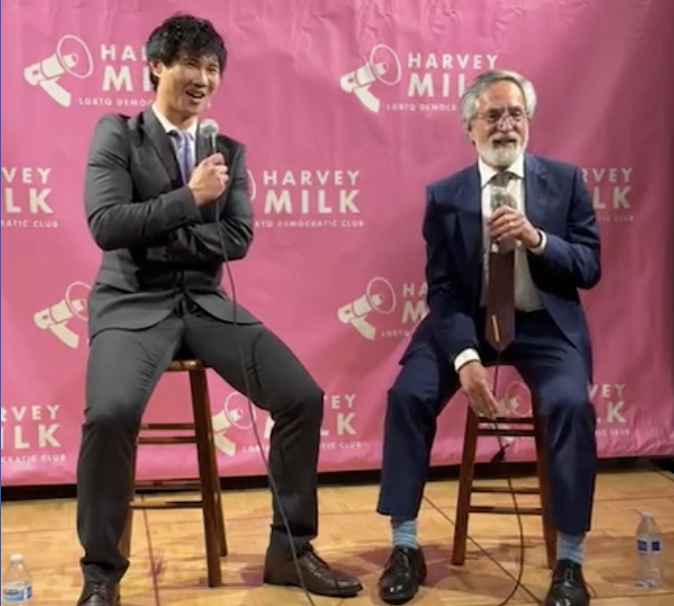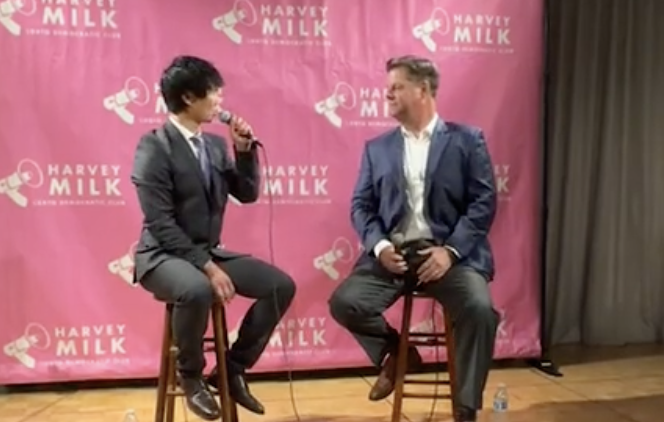The billionaires couldn’t get all of the mayoral candidates to a debate, but the Harvey Milk Club did, in a sense.
The Milk Club forum this week wasn’t a debate in the traditional style; the candidates were never on stage together. Instead, club President Jeffrey Kwong asked each of them a series of questions, then allowed a couple more from the audience. Each session lasted 30 minutes.
But we got a good sense of how the campaigns are shaping up and what the candidates are going to focus on in the next few months.

A basic rundown:
Daniel Lurie is going all-in on being the heir to the Levi Strauss fortune—and is arguing that corporate philanthropy is central to the future of San Francisco. He talked about how Levis’s was a good company that provided LGBTQ+ workers with benefits before the law required it, and how proud he is to be a part of that family. Kwong mentioned that the Gini Coefficient, which measures economic inequality, ranks San Francisco with Rwanda. Lurie’s response: We need more corporate philanthropy, like Tipping Point, which he founded to address the “shocking” level of poverty in the Bay Area. He talked about how much money VISA has given to charity, and how great it was that the Super Bowl generated $13 million for nonprofits when he chaired that committee in 2016. The Super Bowl also led to the displacement of hundreds of unhoused people.
The noted economist Thomas Pikkety is only one of a growing number of scholars who say that relying on the very rich to give a tiny portion of their wealth to the rest of us, at their own discretion and choice, is never going to solve economic inequality and in some cases may make it worse.
Mayor London Breed also sided with the rich.
Kwong asked her, specifically, if her policies were designed to help wealthy people, and she said: “Where are we going to get all this money? We need a balance, we can’t overdo [taxes] so much that they choose other places. We have to attract and retain businesses.”
Business taxes are a tiny fraction of the cost of operating in San Francisco. And do we really think that, for example, David Sacks, the billionaire who is holding a fundraiser for Donald Trump at his Broadway mansion June 6, is going to leave town because he has to pay very modest new taxes? (Do we really care?)
Breed also repeated the direct Yimby line on housing, saying that the city needs to “get rid of obstacles” to new market-rate housing. “Our policies are created by design to make housing more expensive and difficult,” she said.
But under her administration, and with the current governor and state Legislature, almost all of those “obstacles” have been removed. Housing prices have not come down. New housing isn’t getting built. “We want to build more affordable housing,” she said, “but with what money?”
Well, the voters approved a measure in 2018 that raises taxes on the city’s biggest businesses and has generated close to $500 million for affordable housing. Breed opposed it at the time, and has refused to spend any of that revenue on housing.
Interestingly, Breed admitted that she played very little role in passing Prop. A, the affordable housing bond, in March. She told Kwong that “a supervisor took the lead in getting the ballot measure passed.” That would be Sup. Aaron Peskin, who is running for mayor.

Sup. Ahsha Safai took direct aim at one of the TogetherSF proposals to eliminate a lot of the city’s commissions. “We need more oversight,” he said. He also said he would opposed any effort to undermine district elections of supervisors, and said that the city has “plenty of resources” to address homelessness.
And he blasted the politics of the redistricting commission, controlled by Breed.
He offered few specific policy proposals.
Peskin took a much more direct progressive line, starting off by celebrating the 45th anniversary of the White Night riots, following the verdict in the case of the killer of Harvey Milk. He called the event “an expression of San Francisco as a city of protest” and said that after more than 30 years of conservative mayors, “I want to bring some of that back.”
Kwong asked him about the standard anti-Peskin rap, that he’s opposed to new housing, and Peskin rattled off the long list of upzonings he’s supported, making room for 100,000 new housing units–more than half of which are not getting built. That’s not because of Nimbys—the buildings are fully approved—but because in this market they don’t make financial sense for speculative investors.
“There are millions of dollars being spent by plutocrats to spin that, he said. “We are smart enough to save San Francisco without destroying our neighborhoods.”
He also said that Breed had opposed Prop. C and Prop. I, two measures he supported to bring in more money for affordable housing.
That, I suspect, will be part of the Peskin campaign: He supports affordable housing, but not market-rate housing that will damage the neighborhoods (without bringing prices down for anyone.)
Peskin also talked about the level of corruption at City Hall, saying that over the years, the response to criminal activity by top department heads has been “either openly encouraged or met by silence.”
Then we saw former Mayor Mark Farrell. It was kind of surreal.
The candidate who is running almost as a Republican kept talking about the “queer community” in a way that frankly made me cringe. He made clear that he thinks that developers have to “build more housing” to make the city more affordable.
There is no evidence anywhere that deregulating market-rate housing ever brings down prices.
So this is where the debate is going. There are three candidates running hard to the right (Breed, Lurie, Farrell), one candidate who is trying to find a line (Safai) and one (Peskin) who is taking a strong progressive approach but also reaching to the neighborhoods that may be more worried about excessive development.
It’s only May. There’s a long way to go. And nobody at this point is a front runner.
Full disclosure: My son works for the Peskin campaign.





